人教版英语六年级上册第六单元
人教版六年级上册英语第六单元
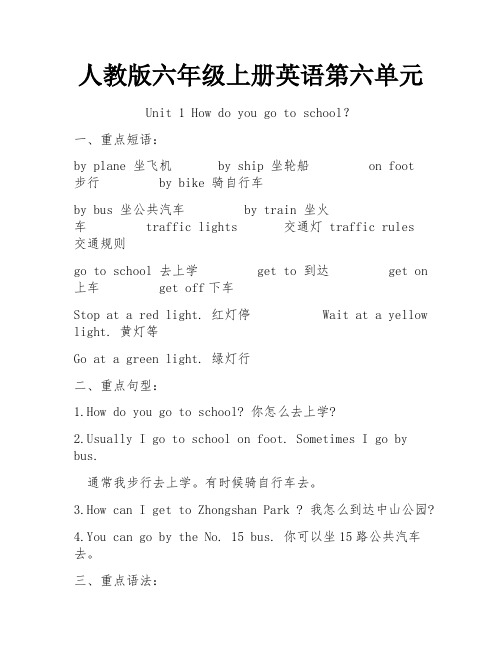
人教版六年级上册英语第六单元Unit 1 How do you go to school?一、重点短语:by plane 坐飞机 by ship 坐轮船 on foot步行 by bike 骑自行车by bus 坐公共汽车 by train 坐火车 traffic lights 交通灯 traffic rules交通规则go to school 去上学 get to 到达 get on 上车 get off下车Stop at a red light. 红灯停 Wait at a yellow light. 黄灯等Go at a green light. 绿灯行二、重点句型:1.How do you go to school? 你怎么去上学?ually I go to school on foot. Sometimes I go by bus.通常我步行去上学。
有时候骑自行车去。
3.How can I get to Zhongshan Park ? 我怎么到达中山公园?4.You can go by the No. 15 bus. 你可以坐15路公共汽车去。
三、重点语法:1、There are many ways to go somewhere.到一个地方去有许多方法。
这里的ways一定要用复数。
因为there are是There be句型的复数形式。
2、on foot 步行乘坐其他交通工具大都可以用介词by…,但是步行只能用介词on 。
4、go to school的前面绝对不能加the,这里是固定搭配。
5、USA 和 US 都是美国的意思。
另外America也是美国的意思。
6、go to the park 前面一定要加the. 如果要去的地方有具体的名字,就不能再加the ,如果要去的地方没有具体名字,都要在前面加the. ( go to school除外。
)7、How do you go to …?你怎样到达某个地方?如果要问的是第三人称单数,则要用:How does he/she…go to …?8、反义词:get on(上车)---get off(下车) near(近的)—far(远的) fast(快的)—slow(慢的)because(因为)—why(为什么) same(相同的)—different(不同的)9、近义词:see you---goodbye sure---certainly---of course10、频度副词:always 总是,一直 usually 通常 often经常 sometimes 有时候 never 从来不针对练习I.中英互译:boat_________ taxi_______ motorbike_______ bus _______地铁轮船飞机火车附近走路骑单车上学because_______ by car _______ sometimes________ often________II.用in,on,under,by,near填空。
新人教版PEP小学六年级上册英语第六单元Unit 6 How do you feel教案教学设计

新人教版PEP小学六年级上册英语第六单元Unit 6 How do you feel教案教学设计Unit 6 How do you feel?单元整体分析本单元是人教版英语六年级上册的第六单元,单元的话题是“How do you feel?”本单元通过不同的场景,提供了关于表达情绪和心理状态、疏导他人情绪提出建议的句型。
共三个版块:A 部分,B部分和C 部分。
A部分包括重点词汇和情景对话,共两个课时。
第一课时展示Sarah和小猫在不同生活事件中的状态和情绪,引出核心词汇和句型。
第二课时通过Sarah和Sam谈论动画片,呈现核心句型be+ 表示情绪的形容词。
A 部分重点掌握词汇和核心句型。
B部分包括重点词汇、情景对话和读和写,共三个课时。
第一课时通过呈现不同人物在不同情境中表现的不同情绪和感受的场景,引出疏导情绪和表示建议的句型:... should... Don’t...第二课时通过Sarah姐弟和母亲之间的对话,进一步巩固疏导情绪和表示建议的句型。
第三课时通过Robin和蚂蚁互相帮助的故事,拓展本单元所学知识。
B部分重点是核心词汇和句型的掌握。
将B部分中的听力测试、词汇规律活动和C部分的故事,组成一课时。
重点是复习巩固本单元所学重点词汇和句型。
在组织课堂的教学中,首先要了解学生学情,整体把握本单元教学内容,教学重点和教学难点,结合本单元主题“How do you feel?设计教学。
借用教材设定的情境、课件、图片等方式呈现,引导学生在合作学习中正确表达所学句型,培养学生的语言交际能力。
单元教学目标1. 知识目标(1)能够听、说、读、写单词和词组:sad, angry, happy, worried, afraid, see the doctor, do more exercise, wear warm clothes, take a deep breath, count to ten.(2)能够听、说、认读单词:feel, wrong, ill, chase, mice, should, well, sit, grass, hear, ant, worry, stuck, mud, pull, everyone(3)能够听、说、读、写句型:How do you feel?The mice are afraid of the cat.The cat is angry with them.He should see a doctor.Don’t be angry.(4)能够掌握句式:主语+be+表示情绪的形容词。
六年级上册英语人教版,第六单元课文
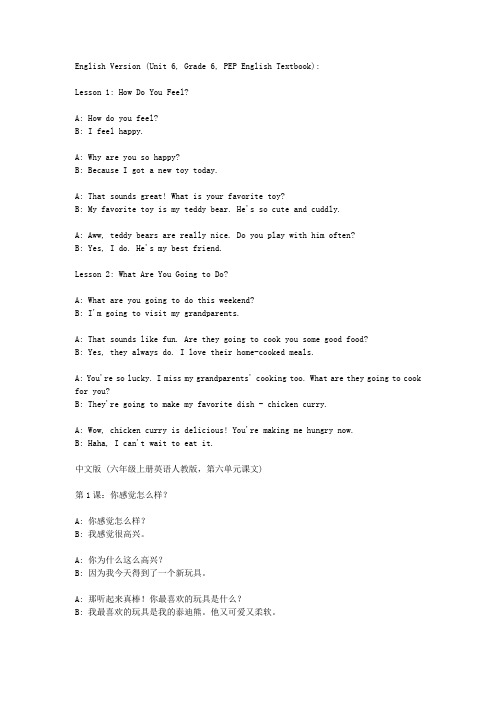
English Version (Unit 6, Grade 6, PEP English Textbook):Lesson 1: How Do You Feel?A: How do you feel?B: I feel happy.A: Why are you so happy?B: Because I got a new toy today.A: That sounds great! What is your favorite toy?B: My favorite toy is my teddy bear. He's so cute and cuddly.A: Aww, teddy bears are really nice. Do you play with him often?B: Yes, I do. He's my best friend.Lesson 2: What Are You Going to Do?A: What are you going to do this weekend?B: I'm going to visit my grandparents.A: That sounds like fun. Are they going to cook you some good food?B: Yes, they always do. I love their home-cooked meals.A: You're so lucky. I miss my grandparents' cooking too. What are they going to cook for you?B: They're going to make my favorite dish - chicken curry.A: Wow, chicken curry is delicious! You're making me hungry now.B: Haha, I can't wait to eat it.中文版 (六年级上册英语人教版,第六单元课文)第1课:你感觉怎么样?A: 你感觉怎么样?B: 我感觉很高兴。
人教版英语六年级上册第六单元

人教版英语六年级上册第六单元 人教版英语六年级上册第六单元是关于"At the Animal Park"的学习内容。
本单元主要介绍了关于动物园的单词、句型和语法知识。
通过本单元的学习,学生将能够提升对动物、颜色、形容词等方面的认识,并培养学生的听、说、读、写的综合能力。
本单元中,我们将学习到关于动物园的一些常用词汇,如lion、elephant、panda等,这些词汇将会通过图片、动画等多种方式进行呈现,帮助学生更好地理解和记忆。
在学习这些词汇的同时,我们也将学习它们的形容词,如big、cute等,以及一些形容词的比较级和最高级的用法。
通过这些有趣的活动,我们将培养学生的观察力和记忆力。
除了词汇和形容词,本单元还将学习关于颜色的单词,如red、yellow等。
通过与动物园中的动物进行搭配,学生将能够更好地掌握这些颜色的词汇,并能够简单地用英语表达自己最喜欢的颜色。
在学习单词和词汇的基础上,本单元还将进行一些句型和语法的学习。
其中包括描述动物的外貌和性格特点的句子,以及使用形容词的比较级和最高级进行比较的句子。
通过这些语法知识的学习,学生将能够进行更多关于动物的交流和描述,提升他们的口语表达能力。
在课堂上,老师将采用多种教学方法和教具,如图片、卡片、录音等,帮助学生更好地理解和运用单词、句型和语法知识。
同时,老师也会通过各种形式的活动和游戏,如配对游戏、问答游戏等,激发学生的学习兴趣和参与度。
在课后,学生可以通过课本上的练习题和作业,进行巩固和复习。
同时,老师也鼓励学生利用课外时间进行更多的阅读和听力练习,以提升他们的英语能力。
除了书面作业,学生还可以通过与同学的交流和互动,加深对学习内容的理解和记忆。
总的来说,人教版英语六年级上册第六单元是一个有关动物园的单元,通过学习动物的词汇、形容词以及描述句子和语法知识,培养学生的听、说、读、写的综合能力,提高他们的英语交流能力。
人教版六年级上册英语第六单元单词

第一节词汇概述1.1 单词的定义和作用单词是语言的基本单位,是构成句子和表达意思的基本要素。
在语言学中,单词是最小的能独立运用的、有意义的语言单位。
通过学习单词,人们可以扩大词汇量,提高语言表达能力。
1.2 单词的分类单词可以根据词性、构词方式、词义等进行分类。
根据词性可分为名词、动词、形容词、副词等;根据构词方式可分为派生词、复合词、缩略词等;根据词义可分为实词和虚词等。
1.3 单词记忆的重要性单词是语言学习的基础,对于学习者来说,掌握大量的单词是十分重要的。
在英语学习中,通过不断地记忆和运用单词,可以提高语言水平,更好地进行交流和表达。
第二节本单元单词详解2.1 单词列表本单元的单词包括:cook, w本人ter, police officer, doctor, present, balloon, card, flower, cake, happy, sad, excited等。
2.2 单词的音标和发音在学习单词时,学生需要掌握正确的发音和音标,以便正确地使用这些单词。
“cook” [kʊk], “w本人ter” [ˈweɪtər], “police officer” [pəˈlis ˈɔfəsər], “doctor” [ˈdɒktər]等。
2.3 单词的词性和词义在学习单词时,学生需要了解每个单词的词性和词义。
“cook”是动词,意为“烹饪”;“w本人ter”是名词,意为“服务员”;“police officer”是名词,意为“警察”;“doctor”是名词,意为“医生”等。
第三节单词教学策略3.1 词汇量的扩大在教学中,老师可以通过词汇量扩大的任务来帮助学生更好地掌握单词。
可以设计一些生活场景,让学生在实际情境中运用这些单词,加强记忆和理解。
3.2 多种形式的训练为了帮助学生更好地掌握单词,老师可以设计多种形式的训练,比如游戏、歌曲、故事等,让学生在愉快的氛围中学习单词,提高学习兴趣,加深记忆。
人教版英语六年级上册第六单元 A lets talk
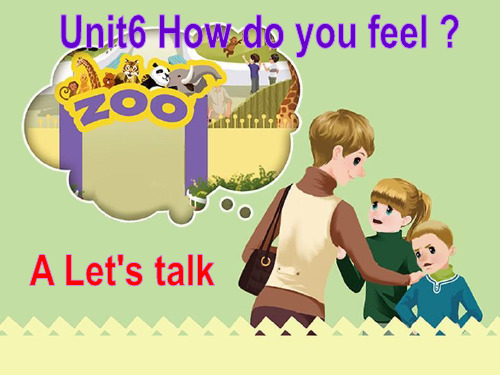
Mission: Please help me catch the mice! (任务:请帮我抓住这些老鼠!) Sam: What’s this cartoon about? Sarah: It’s about a cat. The cat is a police officer. Sam: Cool! Sarah: He chases the mice. They’re afraid of him. Sam: Why? Sarah: Because the mice are bad. They hurt people.
什么也没有!
Can you retell my story?
你能复述我的故事吗?
chases
officer
afraid of
Be a good man and help people.
angry with bad
hurt
Let’s try
The cat is angry with them. Sam: Maybe our cat is chasing a mouse now!
Prize: lucky egg(砸金蛋)
A
B
C
D
E
F
直接奖励1分!
答对得奖励2分:
The tiger is chasing the rabbit now. (chase)
Because the mice are bad.
hurt[hɜ:t]
使受伤,祸害
They hurt people.
老老鼠鼠
be angry with 生某人的气
The cat is angry with them.
maybe [&# cat is chasing a mouse now.
人教版六年级英语上册第六单元知识点归纳及复习题

人教版六年级英语上册第六单元知识点归纳及复习题Unit 6: How Do You Feel?Part AVocabulary:1.Adjectives: angry。
afraid。
ill。
worried。
happyn:A:Hey。
let's have some popcorn."Yum。
I'm so happy。
I love popcorn!"Here you are。
I'll go and get some drinks。
Wait for me."Hey。
where is my popcorn?"Yum。
It was so good."What。
How could you eat all the popcorn。
We should share!"Mum。
if I feel angry。
what should I do?"Well。
first。
take a deep breath。
Then you should count to ten."After that。
"After that。
XXX."Mum。
I XXX I count to ten。
too?"No。
dear。
you should see a doctor."1."Here you are!" is a partially XXX with a n adverb such as "here," "there," or "away," and the verb is "be," "come," or "go,"the XXX.In an inverted sentence。
PEP人教版小学英语六年级上册Unit6单元教案

PEP人教版小学英语六年级上册Unit6单元教案In this lesson。
we will learn about ns and how to ask and describe them in English。
We will start with Let's Try。
where we will listen to a XXX。
Then。
we will move on to Let's Talk。
where we will watch a cartoon and learn new vocabulary words such as chase。
mice。
bad。
and hurt。
We will also practice using the "be + adjective" structure to ask about and XXX。
XXX By the end of this lesson。
we will be able to read。
write。
speak。
and understand XXX.What is his/her feeling。
教师引导学生描述图片中人物的情绪和动作,并帮助学生完成课本上的写作活动。
然后,教师让学生分组,互相表演场景,描述当事人的情绪。
教师提供帮助和反馈。
Step 3 Practice1.看图完成句子教师呈现图片,让学生根据图片完成句子,如:He is_________.He feels _________.学生可以在小组内讨论,然后向全班汇报。
2.口语练教师让学生分组,每组派两名代表到讲台前,一组表演一个场景,另一组描述当事人在这种场景中的感受。
教师提问:How does he/she feel?扩大操练范围。
Step 4 Summary教师总结本课教学内容和重点,让学生回答问题:What have we learned today。
人教新版 英语六年级上册 第六单元中文翻译
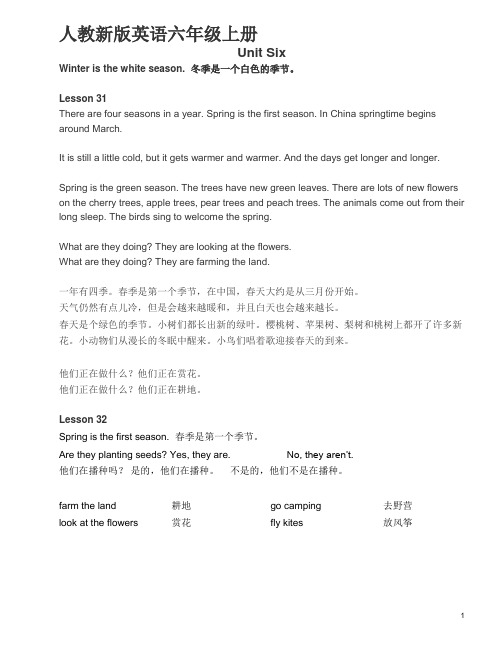
人教新版英语六年级上册Unit SixWinter is the white season. 冬季是一个白色的季节。
Lesson 31There are four seasons in a year. Spring is the first season. In China springtime begins around March.It is still a little cold, but it gets warmer and warmer. And the days get longer and longer.Spring is the green season. The trees have new green leaves. There are lots of new flowers on the cherry trees, apple trees, pear trees and peach trees. The animals come out from their long sleep. The birds sing to welcome the spring.What are they doing? They are looking at the flowers.What are they doing? They are farming the land.一年有四季。
春季是第一个季节,在中国,春天大约是从三月份开始。
天气仍然有点儿冷,但是会越来越暖和,并且白天也会越来越长。
春天是个绿色的季节。
小树们都长出新的绿叶。
樱桃树、苹果树、梨树和桃树上都开了许多新花。
小动物们从漫长的冬眠中醒来。
小鸟们唱着歌迎接春天的到来。
他们正在做什么?他们正在赏花。
他们正在做什么?他们正在耕地。
Lesson 32Spring is the first season. 春季是第一个季节。
Are they planting seeds? Yes, they are. No, they aren’t.他们在播种吗?是的,他们在播种。
2021-2022人教版英语六年级上册第六单元知识总结
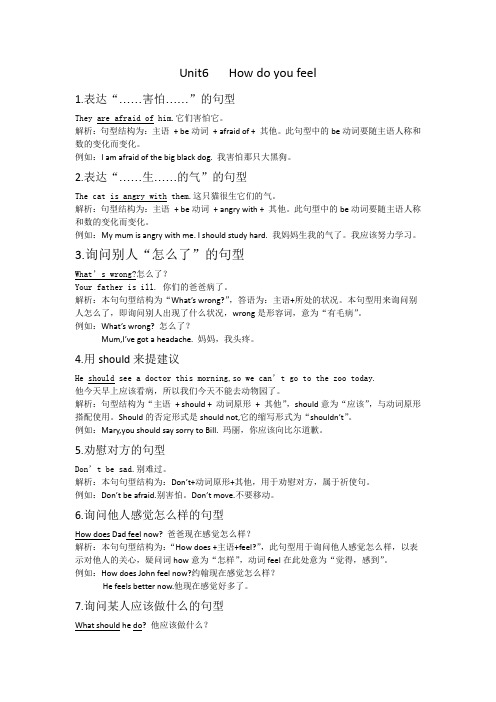
Unit6 How do you feel1.表达“……害怕……”的句型They are afraid of him.它们害怕它。
解析:句型结构为:主语+ be动词+ afraid of + 其他。
此句型中的be动词要随主语人称和数的变化而变化。
例如:I am afraid of the big black dog. 我害怕那只大黑狗。
2.表达“……生……的气”的句型The cat is angry with them.这只猫很生它们的气。
解析:句型结构为:主语+ be动词+ angry with + 其他。
此句型中的be动词要随主语人称和数的变化而变化。
例如:My mum is angry with me. I should study hard. 我妈妈生我的气了。
我应该努力学习。
3.询问别人“怎么了”的句型What’s wrong?怎么了?Your father is ill. 你们的爸爸病了。
解析:本句句型结构为“What’s wrong?”,答语为:主语+所处的状况。
本句型用来询问别人怎么了,即询问别人出现了什么状况,wrong是形容词,意为“有毛病”。
例如:What’s wrong? 怎么了?Mum,I’ve got a headache. 妈妈,我头疼。
4.用should来提建议He should see a doctor this morning,so we can’t go to the zoo today.他今天早上应该看病,所以我们今天不能去动物园了。
解析:句型结构为“主语+ should + 动词原形+ 其他”,should意为“应该”,与动词原形搭配使用。
Should的否定形式是should not,它的缩写形式为“shouldn’t”。
例如:Mary,you should say sorry to Bill. 玛丽,你应该向比尔道歉。
5.劝慰对方的句型Don’t be sad.别难过。
六年级上册英语人教版,第六单元课文
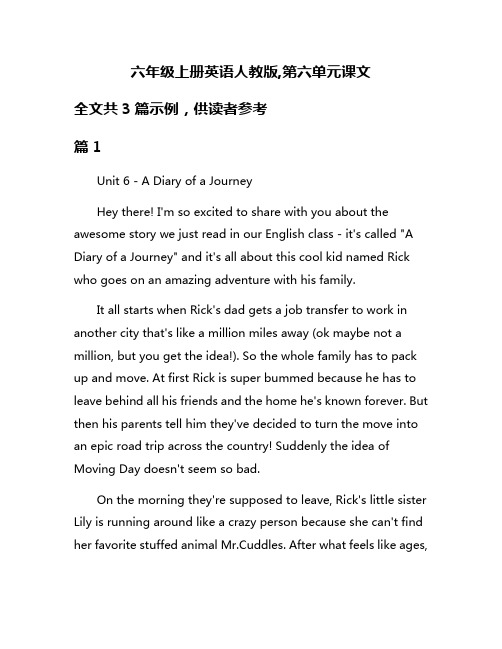
六年级上册英语人教版,第六单元课文全文共3篇示例,供读者参考篇1Unit 6 - A Diary of a JourneyHey there! I'm so excited to share with you about the awesome story we just read in our English class - it's called "A Diary of a Journey" and it's all about this cool kid named Rick who goes on an amazing adventure with his family.It all starts when Rick's dad gets a job transfer to work in another city that's like a million miles away (ok maybe not a million, but you get the idea!). So the whole family has to pack up and move. At first Rick is super bummed because he has to leave behind all his friends and the home he's known forever. But then his parents tell him they've decided to turn the move into an epic road trip across the country! Suddenly the idea of Moving Day doesn't seem so bad.On the morning they're supposed to leave, Rick's little sister Lily is running around like a crazy person because she can't find her favorite stuffed animal Mr.Cuddles. After what feels like ages,they finally locate the poor guy underneath Lily's bed and hit the road. Phew!Their first stop is the Grand Canyon. Can you even imagine how insanely massive and gorgeous that thing must be to see up close? Rick says in his diary that it's like someone took a huge bite out of the earth. From there, they travel to all sorts of amazing natural wonders - ginormous forests, towering mountains, endless deserts. One day they even stumble upon a real live cowboy ranch where Rick gets to help out with herding cattle! How cool is that?But the journey isn't all just fun and games. On day six, they get caught in the middle of a huge thunderstorm while driving through the mountains. The skies open up and rain starts pouring down like crazy. Rick's dad has to pull over because he can barely see the road in front of them. While waiting for the storm to pass, the fam ends up having an impromptu pajama party and campout right there in the car! They tell spooky stories, play road trip games, and munch on snacks. It's one of Rick's favorite memories from the whole trip.Finally, after two weeks of traversing the country, they arrive at their new home. Even though Rick was originally super sad to leave his hometown, he admits that after having such an epicjourney, he feels ready to start over in a new place. The trip gave him so many incredible experiences and allowed him to see parts of America he'd only read about in books before. He got to spend quality time with his family, keep an awesome diary of his adventures to look back on, and now he's excited to begin the next chapter.I don't know about you, but reading Rick's diary made me want to pack a bag and hit the open road myself! It just goes to show that sometimes the biggest adventures can happen when your plans get flipped upside down. All you need is an open mind, a sense of excitement for the unknown, and your loving family by your side. Those are the ingredients for one unforgettable journey!篇2My Favorite Unit: All About SportsHey there! My name is Lily and I'm a sixth grader. I have to say, my favorite unit in our English textbook this year was definitely Unit 6 - All About Sports. I'm a huge sports fan, so learning all about different sports and athletes was right up my alley!The unit kicked off with a really cool text called "The Skating Craze." It was all about how roller skating became this massive trend in the 1800s and how it allowed women more freedom of movement at a time when that was pretty rare. I thought it was fascinating to learn about the cultural impact roller skating had back then. The reading passages gave a neat glimpse into history.But my absolute favorite part was the second text - the biography of Chinese Olympic gymnast Cheng Fei. What an inspiring person! Reading about how dedicated and hardworking she was from such a young age really motivated me. Her coaches recognized her talent and commitment early on, which helped set her on the path to greatness. I admire her strength, both physical and mental. Winning gold medals at multiple Olympics is no joke! Her story терс enforced how discipline, passion and perseverance can lead to amazing achievements.In the third part of the unit, we read interviews with three young sports fans from around the world. I could totally relate to their enthusiasm for their favorite athletes and teams! That kid from Canada who collects hockey jerseys sounds just like my friend Marc. The readings explored how sports can bring peopletogether across cultures by giving us shared interests and heroes to cheer for. Very true!Of course, no English unit would be complete without practicing our skills through various exercises. We had to answer comprehension questions, analyze language use, practice vocabulary, and do lots of writing activities based on the texts. At first, some of the tasks seemed challenging, like having to summarize longer texts. But working through them step-by-step really helped reinforce what we learned.My favorite activity, though, was the research project at the end of the unit. We had to investigate a sport of our choice and create a poster presentation about its history, rules, equipment and a famous athlete. I chose badminton since my parents are avid players. Researching my topic and putting everything together was a lot of work, but also so much fun! I enjoyed getting to share my findings with my classmates too.All in all, Unit 6 was an absolute blast for me as a sports lover. The readings and activities catered perfectly to my interests while helping me build up my English abilities. I came away with new knowledge about the cultural impact of sports, a deeper appreciation for the hard work elite athletes put in, and stronger language skills overall. Badminton, gymnastics, hockey - bringon all the sports units! This was an overview of "All About Sports" that I won't soon forget.篇3A Glimpse into the English WorldHey there! I'm here to share my thoughts on what we've learned in Unit 6 of our English textbook. Get ready for an adventure through different cultures and exciting stories!The unit kicked off with a reading passage called "The Rainforest". It was all about the amazing Amazon rainforest and the incredible diversity of life that thrives there. I wasmind-blown by the facts - did you know that one single rainforest reserve in Peru is home to more species of birds than the entire United States and Canada combined? Insane!The passage also talked about the threats facing rainforests, like deforestation and pollution. It made me realize how crucial it is to protect these natural wonders. After all, they're the lungs of our planet, producing oxygen and absorbing carbon dioxide. Plus, so many unique plants and animals depend on them for survival. I feel like we all need to do our part, even if it's something small like recycling or reducing waste.Then we had a dialogue that followed two students, Amy and Tom, as they visited the Outdoor Club at their school. I thought it was super cool that their school had a club dedicated to camping, hiking, and exploring nature. The dialogue walked us through all the awesome activities the club does, from setting up tents to cooking over a campfire. It definitely sparked my interest in joining a similar club - being outdoors and getting some fresh air sounds like a great way to take a break from hours of studying!My favorite part of the unit, though, was the story "The Hunting Story". It was a gripping tale set in ancient times about a young hunter named Kemaz. The vivid descriptions of the hunt for deer really put you in Kemaz's shoes as he tracked his prey through the forest with persistence and skill. But the most powerful moment was when he decided to spare the deer's life after seeing it had a young fawn. That act of compassion spoke volumes about Kemaz's character. It reminded me that even in harsh environments, showing mercy is a noble quality.Through the stories and dialogues, we picked up tons of new vocabulary related to nature, wildlife, and outdoor activities. Words like "canopy", "poacher", "fawn", and "pitch a tent" were all new additions to my English vocabulary bank. The morewords I learn, the more I'm able to express myself clearly. It's like unlocking another piece of the English world.We also practiced useful language patterns for making suggestions ("How about...?", "We could..."), expressing preferences ("I'd prefer...", "I'd rather..."), and describing processes (using phrases like "first", "then", "next", "after that"). These will undoubtedly come in handy whenever I need to recommend an activity, state my opinion, or explain the steps of something. Communication is key, right?Overall, I feel like Unit 6 opened my eyes to the wonders of nature while also making me think critically about environmental issues. It was amazing to learn about creatures and habitats that are so different from what I'm used to. Reading their stories gave me a deeper appreciation for the diversity of life on our planet.At the same time, I realized that nature's treasures are fragile and need protecting. Deforestation, pollution, poaching - they're all threats that put species at risk of extinction. It's up to us to make smart choices and think about how our actions impact the environment, even in small ways. We're all inhabitants of this planet, after all, so we should do our part to take care of it.I'm excited to see what other cultures and perspectives await me as I continue my English studies. Every new unit is anotheropportunity to expand my understanding of the world. Who knows, maybe I'll be inspired to join an outdoors club, go camping, or even pursue a career in conservation one day! For now, I'll keep an open mind, learn as much as I can, and have fun on this journey through the English world.。
最新完整版人教版六年级英语上册第六单元知识点归纳总结及作文范文

Unit 6 How do you feel一、词汇与短语1、重点单词1. angry /ˈæŋɡrɪ/ 生气的2. afraid /əˈfreɪd/ 害怕3.sad /sæd/ 难过的4.worried /ˈwʌrɪd/ 担心的;发愁的5.happy /ˈhæpɪ/ 高兴的6.wear /weə(r)/ 穿7.more /mɔː(r)/ 更多的8.deep /di:p/ 深的9.breath /breθ/ 呼吸10.count /kaʊnt/ 数数11.chase /tʃeɪs/ 追赶12.mice /mais/ (mouse的复数) 老鼠13.bad /bæd/ 邪恶的;坏的14.hurt /hɜːt/ (使)受伤15.ill /ɪl/ 有病;不舒服16.wrong /rɒŋ/ 有毛病17.should /ʃʊd , ʃəd]/ 应该18.feel /fi:l/ 觉得;感到19.well /wel/ 健康;身体好20.sit /sɪt/ 坐21.grass /gra:s/ 草坪22.hear /hɪə(r)/ 听见23.ant /ænt/ 蚂蚁24.worry /ˈwʌrɪ/ 担心;担忧25.stuck /stʌk/ 陷住;无法移动26.mud /mʌd/ 泥27.pull/pʊl/ 拉;拽28.everyone /ˈevriwʌn/ 没人2、重点短语1. see a doctor 看病2.take a deep breath 深深吸一口气3.count to ten 数到十4.have some popcorn 吃点爆米花5.wait for me 等等我6.be afraid of……害怕……7.be angry with……对……生气8.next time 下次9.go to the hospital 去医院看病10.do more exercise 多做运动11.wear warm clothes 穿暖和的衣服12.on the grass 在草地上13.the next day 第二天14.in the mud 在泥泞中15.out of the mud 走出泥潭16.each other 彼此;互相3、重点句子1. They're afraid of him. 它它它它它它2. The cat is angry with them. 它它它它它它它它它它3. What's wrong? 它它它它4. Your father is ill. 它它它它它5. He should see a doctor this morning. 它它它它它它它它它它它6. Don't be sad. 它它它它7. I'll go and get some drinks. 它它它它它它它它8. Maybe our cat is chasing a mouse now. 它它它它它它它它它它它7.you should take a deep breath and count to ten. 它它它它它它它它它它二、语法知识点1、询问原因的常用句型句型结构:Why + do/does +主语+动词原形+其他?Why + be动词+主语+其他?回答:because+其他如:Why is the cat angry with the mice?为什么猫生老鼠们的气?--Why is he here? 他为什么在这儿?--Because I invited him. 因为我邀请他了。
人教版英语六年级上册第六单元考点

第六单元考点:描述和询问天气状况一、基本知识点1. 天气的表达方式- What's the weather like today?- It's sunny/cloudy/r本人ny/windy/snowy.2. 询问天气的礼貌方式- Excuse me, what's the weather like today?- May I ask what the weather is like today?3. 回答天气状况- It's sunny, I can go out to play.- It's r本人ny, I have to take an umbrella.4. 表达对天气的喜好- I like sunny days because I can play outside.- I don't like r本人ny days because I can't go out to play.二、相关语法点1. 形容词的比较级- sunny、sunnier、sunnier(sunny的比较级和最高级)2. 简单句和选择疑问句的构成- Is it sunny today?- Yes, it is.3. 特殊疑问句的构成- What's the weather like in Beijing today?- It's sunny.三、常见错误和解决方法1. 错误:It's a sunny day, I can play soccer.- 解决方法:根据句子的意思,应该用because连接原因,“It's a sunny day, so I can play soccer.”2. 错误:I can play soccer because it's a sunny day.- 解决方法:应该将原因放在前面,使用倒装句,“Because it's a sunny day, I can play soccer.”3. 错误:May I ask you, are you like sunny days?- 解决方法:问句的翻译有问题,应该改为“May I ask you, do you like sunny days?”四、实用练习1. 根据图片描述天气状况- 给学生一些图片资源,要求他们根据图片描述天气状况,加强语言实际运用能力。
人教版六年级英语上册unit-6知识点归纳(附练习)

人教版六年级英语上册u n i t-6知识点归纳(附练习)-CAL-FENGHAI.-(YICAI)-Company One1Unit 6 How do you feel?Part A一、主要词汇①形容词:angry生气的 afraid害怕的 ill生病的 worried担心的happy高兴的二、课文导入AHey, let’s have some popcorn.Yum! I ’m so happy. I love popcorn!Here you are.【1】 I ’ll go and get some drinks. wait for me.【2】Hey, where is my popcorn?Yum! It was so good.What How could you eat all the popcorn!【3】We should share!Mum, if I feel angry, what should I do?【4】Well,first,take a deep breath.【5】Then you should count to ten.After that...After that, you won’t feel so angry.Mum, I feel ill. Should I count to ten,too?No,dear,you should see a doctor.1、Here you are!给你!这是一个部分倒装的句子。
当句子以here,there,away等地点副词开头,且谓语动词是be动词,come,go等时,句子常用倒装结构。
①在倒装句中,如果主语是人称代词,则主语与谓语不倒装,构成“Here/there/away...+ 主语 + 谓语动词”部分倒装结构。
例句:Here we are!我们到了!Away he went!他离开了!②如果句子的主语为名词,句子常用完全倒装结构,即构成“here/there/away...+谓语动词+主语”结构。
人教版六年级英语上册第六单元课件

How does he feel now?
worried
Let’s learn
Listen and answerSarah is angry, what does the cat feel? Why is Sarah sad ?
Can you guess their feelings?
1.Where are they?A. At home B. At school
2.What will they do?A. Eat some fruit B. Watch films
根据课文将下面补全完整
It's cold outside.Sam and Sarah are talking about the black cat________ ________.The black cat is _________with the ___________. Because the ______are bad.They ______people. The black cat ____them. The ________ are afraid of the _________.
听学生用书第58页Let’s talk中的对话录音并跟读,学完之后背诵。
2. 完成《名校课堂》中相关练习。
3. 默写今天学习的单词。
Unit 6 : How do you feel ?
第二课时
Sing a song
If you are happy, clap your hands
How does she feel n家听Let’s learn部分的录音两遍,抄写重点单词。
Unit 6 How do you feel?
Part B let’s talk
人教版六年级英语上册第六单元课件PPT

Tell a story
The lion and the mouse
Homework
• 把今天学习的短文读给家长听。
Unit 6 How do you feel ?
第六课时
Let’s check
Listen again and circle the right answer.
1. How does cold weather make John feel?
A. Sad
How does the lion feel? How the mouse feel now?
What does the story tell us?
A. We should always be nice to each other. B. We shouldn’t hurt ants.
Fill the blanks and retell the story
B. worried
2. Who should Wu Yifan see?
A. Robin
B. a doctor
3. How does Oliver feel now?
A. He feels happy.
B. He feels angry.
4. What should Zhang Peng do?
A. Wear warm clothes. B. Do more exercise.
Write and say
- 1、下载文档前请自行甄别文档内容的完整性,平台不提供额外的编辑、内容补充、找答案等附加服务。
- 2、"仅部分预览"的文档,不可在线预览部分如存在完整性等问题,可反馈申请退款(可完整预览的文档不适用该条件!)。
- 3、如文档侵犯您的权益,请联系客服反馈,我们会尽快为您处理(人工客服工作时间:9:00-18:30)。
Unit 6 This is my sister
一‘根据句意和首字母填写正确的单词(1*10)
1.Jeff and Helen are Jim’s P___________.Jim is their son.
2.The boy is nt my brother.He is my f___________.
3.Lily is my c__________,my aunt’s daughter.
4.That’s a photo of my f___________.Look.These are my father and mother.
5.I am Anna’s brother.Anna is my s____________.
6.Bob’s mother is Mary.Mary’s s_______ is Bob.
7.This is a p________of his family.
8.My mother’s sister is mu a________.
9.That’s my mother.I am her d_____________.
10.Miss White is my English teacher.S________ is a good teacher.
二、选择填空。
(1*10)
()1----Is he your friend/
----______________
A.Yes,she is.
B.No,he isn’t.
C.Yes,they are.
D.No,they aren’t
()2.Is _____________your sister?
A.you
B.her
C.he
D.she
()3._______ her books.
A.It is
B.This is
C.These are
D.That is
()4.-----Is _____ a photo of your parents?
------No,________.
()5.Thanks ________your help.
A,in B.for C.of D.from
()6.Mr.Green and Mrs Green have two children,Jim and Kate.Jim is Kate’s ________.
A.mother
B.brother
C.sister
D.father
()7.---Mom,_______ is my friend,Lilei.
----Lilei,__________is my mother.
A.her,her
B.that;this
C.that,that
D.this,this
()8.Draw a picture _________ your family.And then show it to us.
A.to
B.of
C.from
D.on
()9.----Here _______ some books for you,Jim.
----Thanks very much.
A.is
B.are
C.am
D./
()10.___________ are my parents,and ________is my brother.
A.This,this
B.This,that
C.These,that
D.This;/
三.按要求改写句子(2*5)
1.That’s my friend.(改为复数)
________________________________________
2.Are thise your brothers.(改为单数)
____________________________________________
3.He is a teacher.(改为一般疑问句)
________________________________________
4.Are those your grandparents?(作肯定回答)
______________________________________
5.Thanks very much.(改为同义句)
四、根据对话内容,在空格上填写适当的词完成对话,每空一词。
(1*10)
A.What ____1___ these
B:They’re __2__.
A:Are they ___3__ photos?
B:Yes.They are my family photos.
A:Is __4___your brother.
B:No,it isn’t.That’s ___5___cousin.
A:___6___your cousin’s name?
B:___7__ name is Bob.
A:___8___ these your parents/
B.Yes.__8__ ___10___
五、阅读对话,完成家谱。
(1*8)
Mona:Wow,Look at this photo.
Tim:Yeah,This is my friend,David.
Mona:Whos is your friend?
Tim:The boy in front of the old man.He is David.And this old man is his grandfather,John,Brown. Mona:Is the old woman next to him his grandmother?
Tim:Yes,she is.She is Jean Brown.She is kind old woman.
Mona;Who is the girl in front of David?
Tim;She is David’s cousin.Her name is Kesey.
Mona:Who are the man and woman behind his grandparents?Are they his aunt and uncle?
Tim:No,they aren’t.They They are his parents,Peter Brown and Ann Green.
Mona:I think the young man and woman behind his parents are his aunt,Jane Black and Uncle,Bill Brown.
Tim: You are clever.
()1.The first name of Tom Smith is ______
A.Tom
B.Smith
C.Tom Smith
D.Smith Tom
()2.Is Tom in Class Four,Grrade One?
A:Yes,She is B.No,she isn ’t
C.Yes,he is D,No,it isn’
t ()3.
Tom has a ___________ A.sister B.brother C.cousin D.grandfather
()4.There are(有)________ people(人)in his family.
A. three
B.four
C.five
D.six
()5.You think Mike is a ___________
A. driver
B.doctor
C.teacher
D.student\
()1.Linda lost her keys.
()2.The phone number of Linda is 482-7369.
()3.Tony found a set of keys.
()4.The phone number of Tony is 867-5143.
()5.Grace found an English dictionary.She can call Linda at 867-5143
八、书面表达。
根据你(Bob)在课文中学到的英文格式,给你的pen pal (Mike)写封信,介绍一下你自己的家庭。
(60词左右)。
